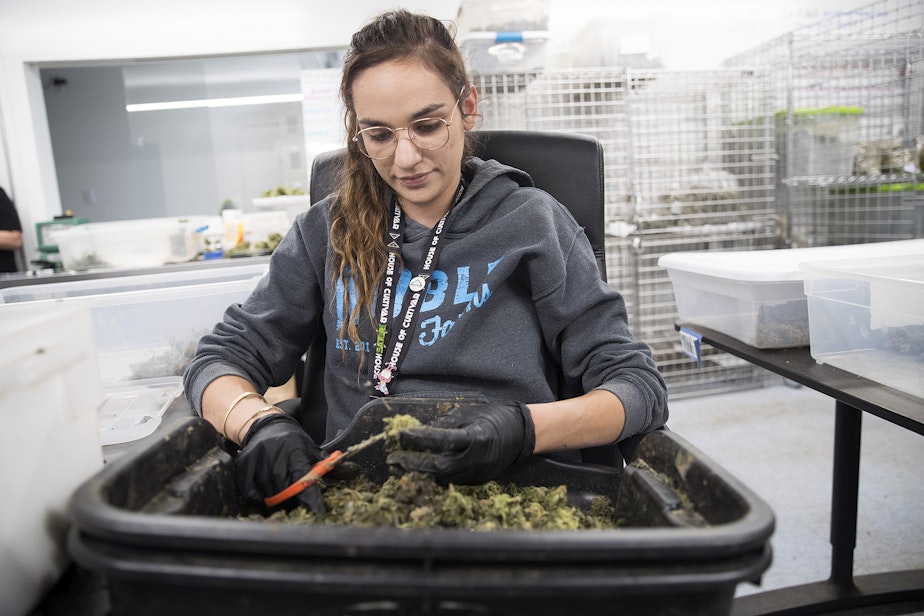Stop saying 'marijuana'? Lawmakers say it's racist

Gov. Jay Inslee recently signed a bill striking the word “marijuana” from the text of all state law. The measure says to use the word “cannabis” instead.
The effort in Washington is part of a national movement to retire the word.
Washington Democrat Melanie Morgan, who sponsored the bill in the state House, calls the word marijuana “pejorative and racist." Morgan said replacing it is merely one way to create change.
Some cannabis retailers and industry trade groups have stopped using the word. Earlier this year, Maine and Virginia also introduced bills about striking the word marijuana from their laws.
Recreational weed is now legal in these states. But lawmakers are seeking to address the ways that decades of anti-drug policies continue to affect communities of color. For instance, arrests and incarceration for drug crimes have hit Black and Latino communities hardest. Arrests can make it harder to find a job, buy a home and build generational wealth.
“This is just another layer, of peeling off the systemic racism that's built in our system,” Morgan said of the effort to retire the word marijuana.
But some historians are raising concerns about this effort. They say those who support it are leaning too heavily on a version of cannabis history that’s seeped into popular culture. They say that Morgan and other reformers who point to racist usage of the word have based that assessment on an incomplete reading of cannabis history.
Sponsored
The marijuana story
Historians note that "marijuana" was the word most people in Mexico used for the drug cannabis by the 19th century. Here in the U.S., by the 1920s and '30s, anti-drug crusaders spread false claims about the effects of smoking marijuana. The 1936 movie “Reefer Madness” famously repeated this misinformation, claiming weed-smoking led to murder, suicide and insanity.
Anti-drug activists often used the word marijuana in a negative way, and the media and government officials also turned it against people of color, including Mexican immigrants and jazz musicians. Then, in 1937, the federal government outlawed the drug.
That popularized narrative is part of why many now say the word marijuana should be retired. But historians KUOW spoke with believe the popular version of cannabis history is incomplete, and ultimately inaccurate.
Sponsored
“The idea that the word marijuana is racist, I just think it's nonsense. Marijuana is just the Mexican word for drug cannabis,” said Isaac Campos, a professor of Latin American history who has studied the story of weed.
The making of a myth
Campos said stories about smoking marijuana leading to madness and violence didn't originate in the U.S. They were first printed in Mexican newspapers, and it was the Mexican government that ended up outlawing the drug first — nearly 20 years before the U.S. did.
U.S. media reprinted anti-weed stories from the Mexican press. And as immigrants moved north, many carried negative stories about marijuana with them.
According to Campos, the more complete story of the word marijuana is a story about the influence of Mexican culture. He believes banning the word would erase that history.
Sponsored
Campos doesn’t deny that racists have sometimes used the word marijuana in a pejorative way. But he argues many other words, such as “salsa,” have also been used in racist ways without anyone calling for their retirement.
"The way we use the word marijuana in the United States is not unlike the way we use the word salsa in the United States. Salsa in Mexico just means 'sauce.' It's any kind of sauce — it could be a Hollandaise sauce — it's not necessarily what we call salsa in this country.
"But the fact that we use it for a certain kind of Mexican sauce that goes on tacos just shows that Mexican cuisine has had a huge influence in this country,” Campos said.
Another cannabis historian, Adam Rathge, said something else is missing from pop-culture histories of weed. Long before anyone in the U.S. linked Mexican immigrants with the word marijuana, doctors and lawmakers in America were raising concerns about consuming cannabis.
“If you read 19th century medical journals or if you go look at laws that are passed in the 19th century, at the state level, there’s immediate concern by American physicians about the potential negative effects of cannabis,” Rathge said.
Sponsored
But that story was forgotten. In its place, by the 1980s, the cannabis legalization movement instead preferred a partially made-up narrative, based largely on an influential book written by a pot legalization activist named Jack Herer, who claimed America had a simple love affair with hemp and cannabis before racist prohibition began.
The film “Dazed and Confused” satirized this version of history, with tales of George Washington smoking weed with Martha Washington’s assistance, back when the "whole country" was supposedly “getting high.”
For her part, Rep. Melanie Morgan stands by the new measure nixing the word marijuana from state law. But she also said she welcomes more information and debate about the linguistic history of the word.
“I'm glad that this is causing conversations, because what this is doing is actually opening the door to bigger issues,” Morgan said.
Sponsored
Morgan pointed to other bills to address structural racism that did not pass this legislative session, including an attempt to increase the number of cannabis businesses licenses that go to communities most affected by the war on drugs, and a bill she sponsored to address racial, economic and social disparities.
The measure striking the word marijuana from Washington state law starts to go into effect this coming June.
CORRECTION 4/1: Due to an editing error, an earlier version of this story noted that Rep. Melanie Morgan took issue with the etymology of the word “marijuana.” Morgan stated that the word is "pejorative and racist," adding that it has “Latino” origins.




